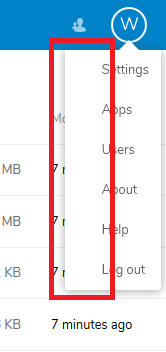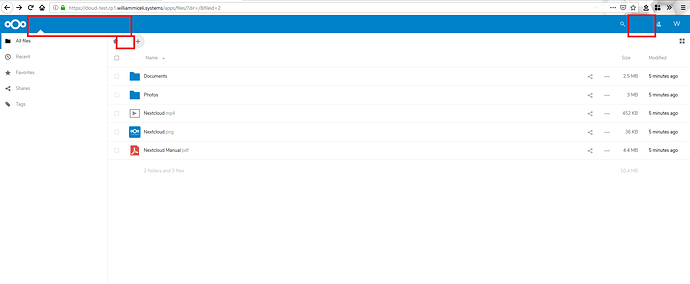Having a small issue with some page assets not showing up after trying to get Nextcloud working through NGINX.
Was previously testing on NC 14, but NC 15 is also showing the exact same issue:

docker-compose.yml:
version: '2'
services:
nextcloud:
image: nextcloud:fpm-alpine
dns: # Using Cloudflare DNS
- 1.1.1.1
- 1.0.0.1
environment:
MYSQL_HOST: mysql
MYSQL_DATABASE: nextcloud
MYSQL_USER: nextcloud_user
MYSQL_PASSWORD: ${DB_USER_PASS}
NEXTCLOUD_ADMIN_USER: ${NC_ADMIN}
NEXTCLOUD_ADMIN_PASSWORD: ${NC_ADMIN_PASS}
expose:
- "80"
- "9000"
labels:
io.rancher.container.pull_image: always
{{- if .Values.HOST_LABEL}}
io.rancher.scheduler.affinity:host_label: ${HOST_LABEL}
{{- end}}
networks:
- public-proxy
restart: on-failure
volumes_from:
- nginx
nginx:
image: nginx:latest # Can't use ":alpine" until I have a way to get the "www-data" user added automatically. (Project for another time)
dns: # Using Cloudflare DNS
- 1.1.1.1
- 1.0.0.1
labels:
io.rancher.container.pull_image: always
{{- if .Values.HOST_LABEL}}
io.rancher.scheduler.affinity:host_label: ${HOST_LABEL}
{{- end}}
io.rancher.sidekicks: nextcloud
{{- if .Values.TRAEFIK_HOST}}
traefik.enable: true
### Start Web Segment
traefik.frontend.entryPoints: http,https
traefik.frontend.headers.forceSTSHeader: true
traefik.frontend.headers.referrerPolicy: no-referrer # Security enhancement (Prevents leaking of referer information)
traefik.frontend.headers.SSLRedirect: true
traefik.frontend.headers.STSPreload: true
traefik.frontend.headers.STSSeconds: 15552000
traefik.frontend.rule: Host:${TRAEFIK_HOST}
traefik.port: "80"
### End Web Segment
{{- else}}
traefik.enable: false
{{- end}}
links:
- mysql
- nextcloud
{{- if eq .Values.REDIS "true"}}
- redis
{{- end}}
networks:
- public-proxy
{{- if .Values.WEB_PORT}}
ports:
- "${WEB_PORT}:80"
{{- end}}
restart: on-failure
volumes:
- /etc/localtime:/etc/localtime:ro # Syncronize time of container with the host system
- /etc/timezone:/etc/timezone:ro # Syncronize timezone of container with the host system
- /RancherCattle/${DATA_DIR}/Configuration/Nextcloud:/var/www/html/config # Nextcloud configuration files
- /RancherCattle/${DATA_DIR}/Configuration/NGINX:/etc/nginx # NGINX configuration files
- /RancherCattle/${DATA_DIR}/Apps:/var/www/html/custom_apps # Nextcloud apps
- /RancherCattle/${DATA_DIR}/Nextcloud:/var/www/html # Nextcloud site
- /RancherCattle/${DATA_DIR}/UserData:/var/www/html/data # Users' data file
mysql:
image: mysql:5
dns: # Using Cloudflare DNS
- 1.1.1.1
- 1.0.0.1
environment:
MYSQL_DATABASE: nextcloud # Will rename this to "nextcloud_db" in the future.
MYSQL_ROOT_PASSWORD: ${DB_ROOT_PASS}
MYSQL_USER: nextcloud_user
MYSQL_PASSWORD: ${DB_USER_PASS}
labels:
io.rancher.container.pull_image: always
{{- if .Values.HOST_LABEL}}
io.rancher.scheduler.affinity:host_label: ${HOST_LABEL}
{{- end}}
networks:
db-admin:
aliases:
- nextcloud # This should allow access from "mysql.nextcloud.rancher.internal"
restart: on-failure
volumes:
- /etc/localtime:/etc/localtime:ro # Syncronize time of container with the host system
- /etc/timezone:/etc/timezone:ro # Syncronize timezone of container with the host system
- /RancherCattle/${DATA_DIR}/Database:/var/lib/mysql
{{- if eq .Values.REDIS "true"}}
redis:
image: redis:latest
dns: # Using Cloudflare DNS
- 1.1.1.1
- 1.0.0.1
labels:
{{- if .Values.HOST_LABEL}}
io.rancher.scheduler.affinity:host_label: ${HOST_LABEL}
{{- end}}
restart: on-failure
volumes:
- /etc/localtime:/etc/localtime:ro # Syncronize time of container with the host system
- /etc/timezone:/etc/timezone:ro # Syncronize timezone of container with the host system
{{- end}}
networks:
db-admin:
external: true # Created by phpMyAdmin stack
public-proxy:
external: true # Created by Traefik stack
nginx.conf:
user www-data;
worker_processes 4; ## Default: 1
# worker_rlimit_nofile 8192;
#error_log /var/log/nginx/error.log warn;
#pid /var/run/nginx.pid;
events {
worker_connections 1024; ## Default: 1024
}
http {
include /etc/nginx/mime.types;
default_type application/octet-stream;
#access_log /var/log/nginx/access.log main;
sendfile on;
tcp_nopush on;
#keepalive_timeout 65;
upstream php-handler {
server nextcloud:9000;
}
server {
listen 80;
listen [::]:80;
server_name _;
# Add headers to serve security related headers
add_header X-Content-Type-Options nosniff;
add_header X-XSS-Protection "1; mode=block";
add_header X-Robots-Tag none;
add_header X-Download-Options noopen;
add_header X-Permitted-Cross-Domain-Policies none;
add_header Referrer-Policy no-referrer;
# Remove X-Powered-By, which is an information leak
fastcgi_hide_header X-Powered-By;
# Path to the root of your installation
root /var/www/html/;
# Will test later
#error_page 403 /core/templates/403.php;
#error_page 404 /core/templates/404.php;
location = /robots.txt {
allow all;
log_not_found off;
access_log off;
}
location = /.well-known/carddav {
return 301 $scheme://$host/remote.php/dav;
}
location = /.well-known/caldav {
return 301 $scheme://$host/remote.php/dav;
}
# set max upload size
client_max_body_size 1G;
fastcgi_buffers 64 4K;
# Enable gzip but do not remove ETag headers
gzip on;
gzip_vary on;
gzip_comp_level 4;
gzip_min_length 256;
gzip_proxied expired no-cache no-store private no_last_modified no_etag auth;
gzip_types application/atom+xml application/javascript application/json application/ld+json application/manifest+json application/rss+xml application/vnd.geo+json application/vnd.ms-fontobject application/x-font-ttf application/x-web-app-manifest+json application/xhtml+xml application/xml font/opentype image/bmp image/svg+xml image/x-icon text/cache-manifest text/css text/plain text/vcard text/vnd.rim.location.xloc text/vtt text/x-component text/x-cross-domain-policy;
location / {
rewrite ^ /index.php$request_uri;
}
location ~ ^/(?:build|tests|config|lib|3rdparty|templates|data)/ {
deny all;
}
location ~ ^/(?:\.|autotest|occ|issue|indie|db_|console) {
deny all;
}
location ~ ^/(?:index|remote|public|cron|core/ajax/update|status|ocs/v[12]|updater/.+|ocs-provider/.+)\.php(?:$|/) {
fastcgi_split_path_info ^(.+?\.php)(/.*)$;
# Mitigate https://httpoxy.org/ vulnerabilities:
fastcgi_param HTTP_PROXY "";
#fastcgi_index index.php;
include fastcgi_params;
fastcgi_param SCRIPT_FILENAME $document_root$fastcgi_script_name;
fastcgi_param PATH_INFO $fastcgi_path_info;
#Avoid sending the security headers twice
fastcgi_param modHeadersAvailable true;
fastcgi_param front_controller_active true;
fastcgi_pass php-handler;
fastcgi_intercept_errors on;
fastcgi_request_buffering off;
}
location ~ ^/(?:updater|ocs-provider)(?:$|/) {
try_files $uri/ =404;
index index.php;
}
# Adding the cache control header for js and css files
# Make sure it is BELOW the PHP block
location ~ \.(?:css|js|woff2?|svg|gif)$ {
try_files $uri /index.php$request_uri;
add_header Cache-Control "public, max-age=15778463";
add_header X-Content-Type-Options nosniff;
add_header X-XSS-Protection "1; mode=block";
add_header X-Robots-Tag none;
add_header X-Download-Options noopen;
add_header X-Permitted-Cross-Domain-Policies none;
add_header Referrer-Policy no-referrer;
# Optional: Don't log access to assets
access_log off;
}
location ~ \.(?:png|html|ttf|ico|jpg|jpeg)$ {
try_files $uri /index.php$request_uri;
# Optional: Don't log access to other assets
access_log off;
}
}
}
I assume it’s an issue with my NGINX configuration, but I’m not yet adept enough with it to figure it out.
Any help is greatly appreciated!
Thank you!
